

Neonicotinoid Pesticide Reduces Bumble Bee Colony Growth and Queen Production. Science under pressure as pesticide makers face MPs over bee threat. Fifty years ago, Rachel Carson published Silent Spring, a stunning revelation of the death of swaths of birds and insects that had been poisoned by pesticides in farmers' fields.
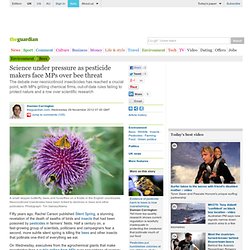
Half a century on, a fast-growing group of scientists, politicians and campaigners fear a second, more subtle silent spring is killing the bees and other insects that pollinate one-third of everything we eat. On Wednesday, executives from the agrochemical giants that make insecticides face a public grilling from MPs over accusations of secrecy and out-of-date rules that are failing to protect nature. They are certain to fight back, saying that the crop protection offered by the multibillion dollar industry is vital in producing cheap, plentiful food and that the science remains uncertain. The stakes are high and the issue is complex. Insecticide 'unacceptable' danger to bees, report finds.
The world's most widely used insecticide has for the first time been officially labelled an "unacceptable" danger to bees feeding on flowering crops.
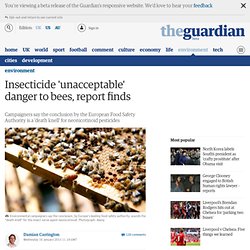
Environmental campaigners say the conclusion, by Europe's leading food safety authority, sounds the "death knell" for the insect nerve agent. The chemical's manufacturer, Bayer, claimed the report, released on Wednesday, did not alter existing risk assessments and warned against "over-interpretation of the precautionary principle". The report comes just months after the UK government dismissed a fast-growing body of evidence of harm to bees as insufficient to justify banning the chemicals. Bees and other pollinators are critical to one-third of all food, but two major studies in March 2012, and others since, have implicated neonicotinoid pesticides in the decline in the insects, alongside habitat loss and disease. Les apiculteurs fuient l'avancée du soja OGM en Argentine. A Common Pesticide Decreases Foraging Success and Survival in Honey Bees.
Dance of the Honey Bee. (Photo: Moyers & Company)Bill presents and introduces the short documentary "Dance of the Honey Bee.
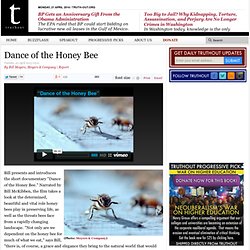
" Narrated by Bill McKibben, the film takes a look at the determined, beautiful and vital role honey bees play in preserving life, as well as the threats bees face from a rapidly changing landscape. "Not only are we dependent on the honey bee for much of what we eat," says Bill, "there is, of course, a grace and elegance they bring to the natural world that would diminish us all were they to disappear. " Producer, Director, Photographer & Editor: Peter Nelson. Narrator: Bill McKibben. Original music: John Powell. Intro Producer: Lena Shemel. Transcript Bill Moyers: The toxic trespassers of which Sandra Steingraber warns afflict all creatures great and small -- from humans to the humblest honeybee. Identification d'un nouvel insecticide mortel pour les abeilles. Pesticides linked to honeybee decline. Common crop pesticides have been shown for the first time to seriously harm bees by damaging their renowned ability to navigate home.
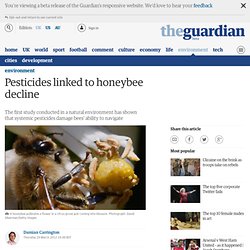
The new research strongly links the pesticides to the serious decline in honey bee numbers in the US and UK – a drop of around 50% in the last 25 years. The losses pose a threat to food supplies as bees pollinate a third of the food we eat such as tomatoes, beans, apples and strawberries. Scientists found that bees consuming one pesticide suffered an 85% loss in the number of queens their nests produced, while another study showed a doubling in "disappeared" bees – those that failed to return from food foraging trips. The significance of the new work, published Science, is that it is the first carried out in realistic, open-air conditions. "People had found pretty trivial effects in lab and greenhouse experiments, but we have shown they can translate into really big effects in the field. Evidence of pesticide harm to bees is now overwhelming. A UK government review of the evidence linking pesticides and harm to bees concluded it did not justify changing existing regulation.
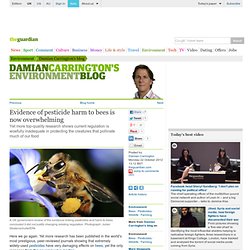
Photograph: Julian Stratenschulte/EPA Here we go again. Yet more research has been published in the world's most prestigious, peer-reviewed journals showing that extremely widely-used pesticides have very damaging effects on bees, yet the only response from the government is inaction. The new paper, published in Nature, shows that bumblebees foraging naturally and exposed to realistic doses of pesticides suffer in two key ways. First they are about twice as likely to die: two-thirds of the bees are lost when exposed to two pesticides compared to only a third when not exposed. Sans abeilles, des agriculteurs forcés de polliniser à la main. Chine / / Asie.
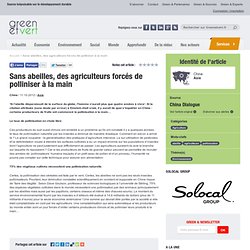
Abeilles : la faillite de l'évaluation des pesticides. LE MONDE | • Mis à jour le | Par Stéphane Foucart Le coupable est-il plutôt l'incompétence ou l'accumulation de conflits d'intérêts ?
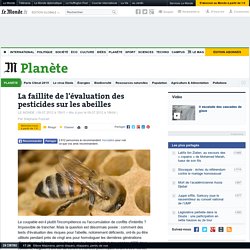
Impossible de trancher. Mais la question est désormais posée : comment des tests d'évaluation des risques pour l'abeille, notoirement déficients, ont-ils pu être utilisés pendant près de vingt ans pour homologuer les dernières générations d'insecticides ? Pesticides [vidéo] Bruxelles veut sauvegarder les abeilles sans proscrire les pesticides. La Commission européenne a indiqué, lundi 28 janvier, qu'elle allait proposer des mesures "contraignantes" pour protéger les abeilles contre les dangers de certains pesticides au sein de l'UE, sans toutefois préconiser une interdiction totale de ces substances.
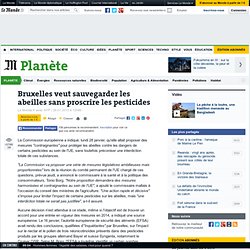
"La Commission va proposer une série de mesures législatives ambitieuses mais proportionnées" lors de la réunion du comité permanent de l'UE chargé de ces questions, prévue jeudi, a annoncé le commissaire à la santé et à la politique des consommateurs, Tonio Borg. "Notre proposition demandera des mesures harmonisées et contraignantes au sein de l'UE", a ajouté le commissaire maltais à l'occasion du conseil des ministres de l'agriculture. An assessment of key evidence about Neonicotinoids and bees [PDF] Mortalités et dépeuplements des colonies d’abeilles... [pdf]